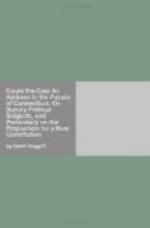recollect that the promoters of these schemes in France,
constantly amused the people with the idea that a new
order of things—new rights—new
principles, were to arise. Who does not recollect
to have read of the perfectability human nature—of
the enlightened age of regenerated France? She
boldly proclaimed herself the example of the world,
and all nations were invited to see her glory, and
enjoy her blessed liberty and her glorious equality.
But mark the issue —Not twelve years have
elapsed before she has returned to an inglorious despotism—She
has exchanged her Capets for a foreign usurper, with
an incalculable loss, and here her history ends.
Such is the constant termination of such revolutions,
and shall we claim to be an exception? How do
we judge as to the propriety of any course of life
except by observation, experience or history?
We see industry and integrity rewarded with competence
or wealth—we see intemperance and sloth
followed with disease, loss of reputation and poverty.
These are sure grounds on which to predict respecting
our neighbors, and by which to regulate our own conduct.
On similar principles a wise people regard the conduct
of other nations, and are solemnly admonished by their
example. Let not then the projector persuade
us to adopt his theories with proofs of their danger
thus glaring before our eyes. Look at the conduct
of our revolutionists for four years past, and see
if you do not discover the genuine principles of the
Jacobins of France—Recollect also that they
had first a Convention—then an Executive
Directory—then a Consul for years—then
a Consul for life, and then an usurper with an hereditary
descent in his family. At each successive revolution
the people were courted—were flattered—were
promised transcendent felicity. The people swore
eternal hatred to Monarchy, and eternal fidelity to
Constitutions, till, heaven, weary of their perjuries,
sent them a despot in his wrath.
My fellow citizens human nature is the same here as
in France—Then before you give ear to the
songs of enchantment Count the Cost—Before
you sell your birthright for a mess of pottage Count
the Cost. Before you consent to yield up the
institutions of your wise and pious ancestors, Count
the Cost—Before you admit universal suffrage
Count the Cost—Before you submit to the
mischievous doctrine of district elections, Count
the Cost.—Before you reject from office
the men whom your hearts approve, Count the Cost,
the great cost of weak and wicked rulers.—Before
you consent to be governed by men whose impudence,
and vice constitute many of their claims to promotion,
Count the Cost. This evil you can prevent by
attending with punctuality on our elections. The
freemen of Connecticut are mighty when they arise in
their strength. No freeman can justify absence
except from necessity.—That people who will
not faithfully attend upon the Choice of their rulers,
cannot expect to retain their freedom.—Trust
not to a majority—say not that things will
go well without me—Such language is unbecoming
freemen—Despair not of a majority—if
you will not “go with the multitude to do evil,”
go against them to do good. Before you neglect
an election Count the Cost —If the loss
of your Vote should prove the loss of an election of
a single man, then will you not have Counted the Cost.




